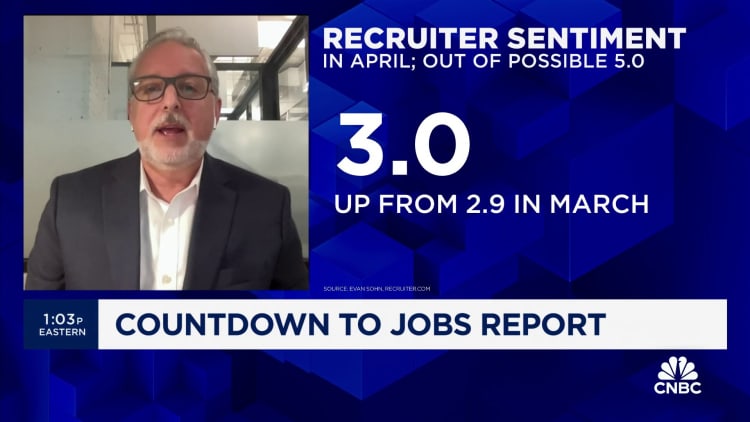As companies race to deploy artificial intelligence in ways that aim to make them better at operating, hiring, and competing, they're also chasing after top AI talent, including filling the position of chief AI officer.
That might not be the best approach, said Mike Doonan, managing partner at executive search firm SPMB, where he specializes in placing high-level tech talent. During a recent CNBC Technology Executive Council virtual event, Doonan told CNBC's "Closing Bell: Overtime" co-anchor Jon Fortt that while his firm is getting called on by companies to do searches for a chief AI officer, it's turning many of them away.
A lot of these companies, Doonan said, "can't really articulate what they want, why they want it, and what are the outcomes that they're looking for."
He said the scenario reminds him of the well-known Christopher Walken skit on "Saturday Night Live" where, as a music producer, Walken's character just keeps asking band members for more cowbell.
"All I could think is that you could change the word 'cowbell' to 'AI,'" Doonan said. "Because every company is saying 'I just want more [AI] and when you ask why, they say 'I don't know, I just need more.'"
The problem is not companies looking to beef up AI talent, but rather that the chase to land these experts is superseding company analysis of where they stand from a data maturity perspective. Without that understanding, Doonan said companies are going to hire "somebody really senior and they're going to be doing [data] clean-up for the next two years. And that's not going to be good for anybody. These people come in and the organization is just not ready for them."
Of course, that hasn't stopped companies from wanting to add a chief AI officer to their ranks. The number of companies that have a "Head of AI" position globally more than tripled in the last five years, and since December 2022 has grown by 13%, according to LinkedIn's latest report on AI at work. More than a quarter of leaders say the CAIO role is their most urgent hiring priority, according to Alteryx's Enterprise of the Future report.
Still, Doonan understands that he might be "the only executive recruiter that's going to convince you not to hire people, because I think that this [CAIO] may already be within the organization."
Over the past few years, boards of directors have started paying closer attention to technology and security in particular, Doonan said. As a result, CTOs, CIOs, and CISOs, among others, are being elevated closer to the C-suite and are interacting more with boards.
"If the CTO is the most senior technology executive at the company, then I think that person can be responsible for coordinating across all the functions of AI whether that's infrastructure, data, or security," he said. "But just throwing another acronym and executive in the mix of a management team that isn't broken is just going to cause more problems than anything else."
One TEC member attending the virtual event where executives are granted anonymity to interact freely and discuss their internal operations with peers, said he applauded Doonan for his perspective, concurring with the viewpoint that not hiring a CAIO right now is not a popular stance.
The tech executive pointed out that people he hears from say the No. 1 problem they have with getting AI initiatives off the ground is dirty data. "There's so much cleanup they have to do that they cannot open up the data to even leverage AI in any meaningful way," he said. "And I think it's going to be a couple of years to clean that up before you can really take advantage of these AI initiatives."
Not surprisingly, the conversation eventually got around to another big issue companies are grappling with: the return to the office. Doonan said his work with tech clients is proving that the "pendulum is definitely swinging in the direction of in-office."
"I don't think it'll ever be five days again, but you're seeing companies that have grown through acquisition with offices all over the place start to consolidate to two to three locations, specifically around the technology talent that they have. And I think it's kind of a good thing."
"In my 20 years, I've hired a bunch of really smart 23-year-olds, but I've never hired one that has the maturity of a 23-year-old. They're all either 13 or 43-years-old," Doonan said.
What he's come to realize is that the ones with the maturity of a 43-year-old "come into the office even when they're not asked to. And I don't know if that's something their parents taught them, or if that's just an innate maturity, but they get the fact that there is some kind of magic to being in person."







